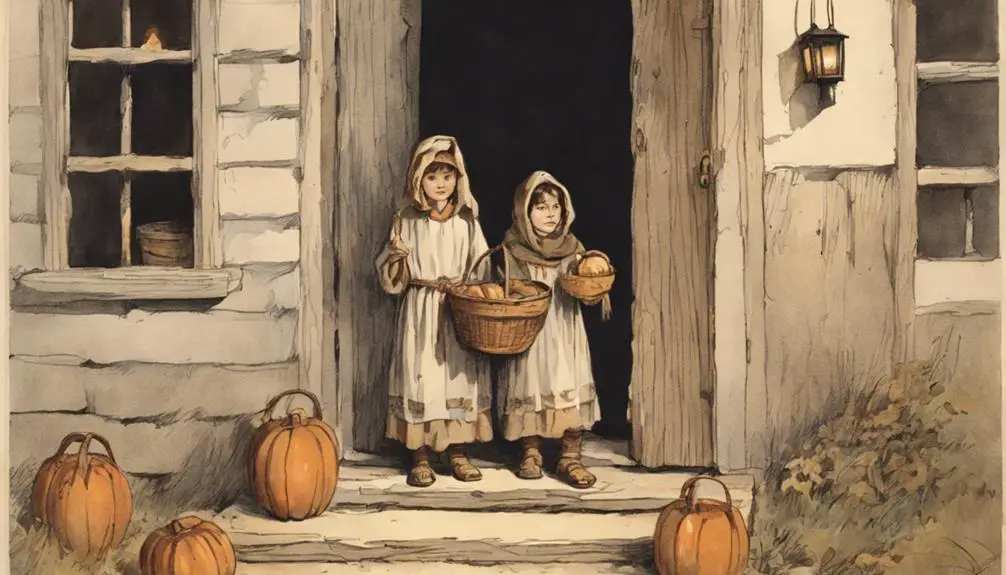Navigate biblical perspectives on deception, generosity, and hospitality to uncover the implications of 'Trick or Treat' within Christian teachings.

What Does Trick or Treat Mean in the Bible
Peeling back the layers of the Bible can be like unwrapping a piece of candy; you're not quite sure what you'll find inside. Now, you may wonder, what does the tradition of 'Trick or Treat' have to do with Biblical teachings? Does it hold any significance, or is it simply a secular practice?
The Bible, while not mentioning Halloween or trick or treating directly, does offer perspectives on deception, generosity, and hospitality. Can these principles shape our understanding of this popular tradition? Let's embark on this exploration together, shall we?
Key Takeaways
- The 'Trick' part of Trick or Treat differs contextually from deceptive practices condemned in the Bible.
- The 'Treat' aspect aligns with biblical teachings on generosity and giving without hesitation.
- Halloween's Trick or Treat tradition can reflect biblical hospitality, showing love and kindness to others.
- Observing Halloween offers Christians an opportunity to respect others' beliefs and discuss spiritual significance.
Understanding 'Trick or Treat' Tradition

To fully grasp the concept of 'Trick or Treat', you must delve into the historical and cultural origins of this well-known Halloween tradition. This tradition has its roots deeply embedded in the cultural origins of ancient Celtic celebrations, revealing significant Pagan influences.
The ancient Celts, a group of people who resided across Western Europe around 2000 years ago, celebrated a festival called 'Samhain'. This festival marked the end of harvest season and the beginning of winter. It was believed that during Samhain, the boundaries between the living and the dead were blurred, allowing spirits to cross over into the world of the living. In an attempt to appease these spirits, people would leave out food and drinks. This practice, over time, morphed into the modern tradition of 'Trick or Treat'.
The 'Trick' in 'Trick or Treat' likely stems from the belief that mischievous spirits could play tricks on the living if not properly appeased. The 'Treat' represents the offerings made to these spirits. Therefore, understanding these cultural origins and Pagan influences is crucial in comprehending the meaning behind 'Trick or Treat'.
Biblical Principles on Deception

While understanding the cultural origins of 'Trick or Treat' provides one perspective, it's equally important to explore what the Bible says about the concept of deception, often inferred from the 'Trick' part of the phrase. Throughout biblical texts, deception is typically portrayed in a negative light. It's seen as a tool used to mislead and cause harm.
In the realm of 'Deceptive Prophecies,' the Bible warns its followers to be wary of false prophets who intentionally mislead. These figures, according to Scripture, use spiritual deceit to lead people away from the righteous path. They use their claimed connection with the divine to propagate lies and falsehoods.
The Bible is clear on its stance against deception, equating it to the works of evil. Spiritual deceit, on the other hand, is considered one of the most dangerous forms because it preys on individuals' faith and spirituality, causing confusion and leading them astray.
The 'Trick' in 'Trick or Treat' then, if viewed through a biblical lens, would seemingly be at odds with these principles, as it suggests deception. However, it's crucial to remember that the context and intention behind the 'Trick' are vastly different from the deceptive and harmful practices condemned in biblical teachings.
Scripture's Perspective on Generosity

Shifting focus to the 'Treat' portion of 'Trick or Treat', the Bible's teachings on generosity offer a profound counterbalance to the concept of deception. The scripture emphasizes charitable giving and benevolent actions, establishing a clear framework for kindness and love towards others.
- Charitable Giving:
In the Bible, you're encouraged to give generously and without hesitation (Proverbs 21:26). It's not about the amount you give, but the heart behind your giving that truly matters to God.
- Benevolent Actions:
The Bible advocates for merciful and compassionate actions towards others, especially those in need (Luke 6:36). It's your actions that reflect God's love in the world.
- Generosity:
Scripture emphasizes that you should be generous not only with your material possessions but also with your time, understanding, and forgiveness (2 Corinthians 9:11).
- Reward for Generosity:
The Bible promises that those who are generous will be blessed in return (Proverbs 22:9). This isn't a promise of material reward, but of spiritual abundance and fulfillment.
The Importance of Hospitality in the Bible

Reflecting on these principles of generosity and kindness, another prominent theme in the scripture is the importance of hospitality, which further emphasizes the Bible's message of selflessness and love towards others. Divine hospitality isn't just a moral duty but a sacred act, often characterized by a sense of fellowship and mutual respect.
Understanding the concept of Biblical fellowship is crucial in this context. It's not just about sharing a meal or providing shelter. It's about opening your heart and your mind as well. It's about recognizing the divine in each other and treating all with inherent dignity and kindness.
The New Testament, for instance, urges believers to show hospitality without grumbling and to entertain strangers, as by doing so, some have unknowingly entertained angels. This suggests that hospitality can lead to unexpected blessings and divine encounters.
In the Bible, hospitality is seen as a fundamental virtue. It's more than a mere social obligation, it's an expression of love and respect for others, reflecting God's love for all. The Bible essentially pushes for a radical hospitality, one that goes beyond borders and cultural norms, breaking down walls and building bridges of understanding and mutual respect.
Applying Biblical Teachings to Halloween

Often, you may find the teachings of the Bible applicable to understanding and navigating contemporary practices such as Halloween. This festival, originating from ancient Celtic traditions, has been widely adopted and adapted over the years. As Christians, you might question its spiritual significance and seek Christian alternatives.
- Respect for Others' Beliefs: You're reminded in Romans 14:13 not to judge others for their practices. If you choose not to participate in Halloween, it's important to respect others who do.
- Love Your Neighbor: Halloween can be a chance to live this commandment. By giving treats, you're showing kindness to your neighborhood kids.
- Christian Alternatives: Some churches arrange 'Fall Festivals' or 'Reformation Day' events. These are designed to provide a safe and Christian-oriented environment for kids.
- Teaching Moments: Halloween's focus on death and the afterlife can be used to engage in discussions about Bible teachings on these subjects.
Frequently Asked Questions
How Does the Act of Dressing up in Costumes During Halloween Align With Christian Beliefs?
When considering how dressing up in costumes during Halloween aligns with Christian beliefs, you'll find divergent views.
Some argue costume morality is in line with Biblical symbols, suggesting the act of dressing up can represent taking on virtues or vices.
Others, however, see it as a deviation from religious teachings.
It's crucial to examine this from a personal faith perspective and understand that interpretations can greatly vary.
Can Christians Find a Balance Between Participating in Halloween Traditions and Upholding Their Faith?
Yes, you can find a balance between participating in Halloween traditions and upholding your Christian faith. By understanding Halloween's history and its secular nature today, you're not compromising your beliefs.
You can participate in 'Faithful Festivities', focusing on fellowship and community. Remember, it's the intent behind actions that matters. If you're respectful and considerate, you're honoring your faith while joining in the fun.
Is There Any Biblical Reference to Celebrating Festivals Like Halloween?
From a Biblical perspective, there's no direct reference to Halloween or similar festivals. Halloween's pagan origins might make you question its compatibility with Christian beliefs.
It's important to remember, you're not obliged to participate. If you do, it's your intention and heart's posture that matter most. Balancing faith and cultural celebrations is a personal journey.
Be thoughtful, discerning, and don't compromise your beliefs.
What Are Some Alternative Ways Christians Can Observe Halloween That Align More Closely With Their Beliefs?
You can explore Christian Halloween alternatives that align with your beliefs. Consider activities like a fall festival, Bible-themed costume parties, or Reformation Day celebrations. These options respect Biblical Halloween interpretations and values, focusing on fellowship and faith rather than trick or treating.
Besides 'Trick or Treat', Are There Other Halloween Customs That May Have a Biblical Interpretation?
Indeed, besides 'trick or treat', other Halloween customs may hold biblical symbolism. The carving of jack-o'-lanterns could be interpreted as the light of Christ driving out darkness.
However, remember Halloween's pagan origins. It's vital to discern whether such interpretations align with your faith.
It's fascinating to explore these customs, but always do so with a keen eye for what truly upholds your Christian beliefs.
Conclusion
In sum, the 'trick or treat' tradition doesn't directly align with the Bible, but it can be examined through biblical principles. Deception, as implied in the 'trick' part, contradicts biblical teachings. Yet, the 'treat' part can reflect biblical generosity and hospitality.
Applying these teachings to Halloween may help you navigate this tradition in a way that respects your faith. Remember, the Bible calls for wisdom in all aspects of life, including our traditions and celebrations.



Sign up